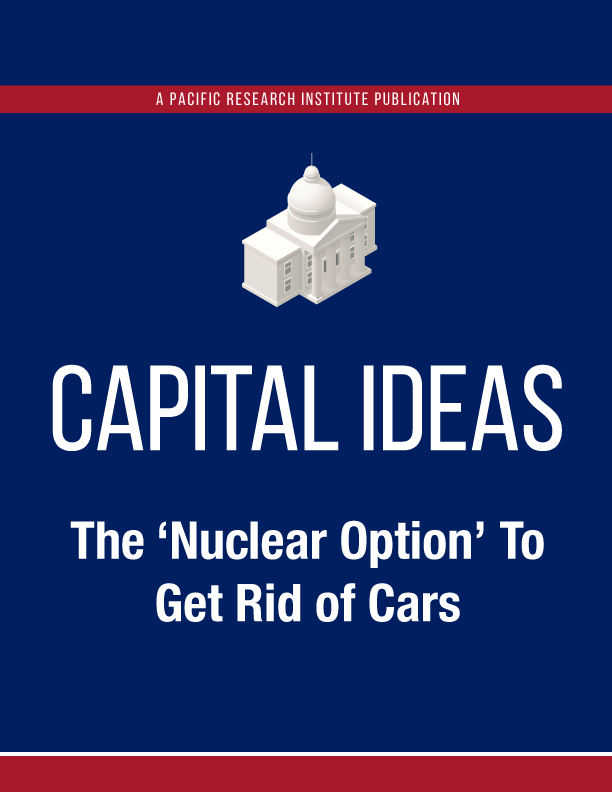There are some things in California that never change. It’s almost always sunny in the southern part of the state, and there’s no reason to expect a cease-fire in the war on cars.
Senate Bill 922, just signed into law by the governor, grants exemptions from the California Environmental Quality Act for “transit, bicycle and pedestrian projects,” according to the Senate floor analysis, and “will extend the sunset of” previous CEQA exemptions, “ensuring that sustainable transportation projects are not unnecessarily delayed.”
While CEQA has choked development for more than 50 years, and yielding to its exhausting restrictions has been the only way some projects could have been completed, the primary purpose of SB922 is to “make it easier and faster to build sustainable transportation projects that help get people out of their cars,” said its author Sen. Scott Wiener.
Weiner and others want Californians to do more “walking, biking and” taking “public transit,” because opting for transportation alternatives to automobiles “is a great way to reduce carbon emissions and improve the livability of our communities.”
Apparently to ensure that no one misunderstands what SB922 is intended to do, Wiener says any project that receives a CEQA exemption “must not add new auto capacity.”
Not everyone wants “help” getting out of their cars. Out of nearly 40 million Californians it’s a good bet that more than a few enjoy the freedom and convenience of travel that can be delivered only by automobiles. Cars go where the drivers tell them to. They’re able to avoid the stops and stations that have been located by officials. While healthy and often enjoyable, walking has it limits, as does biking. Those who have a choice don’t get behind the wheel just to make politicians and planners angry. Choosing to drive is a rational decision based on needs and preferences.
Maybe a single piece of legislation in Sacramento isn’t reason enough to believe that California is at war with cars. But there’s more, always more.
A recent article in the San Jose Spotlight, for instance, promotes fareless transit, in which “riders would pay nothing to hop on or off the bus, train or light rail,” writes columnist Karen E. Philbrick. Increased public transit ridership, she says, “is an important tool for fighting climate change.” It’s the same rationalization used over and again to shove people into mass transit.
Philbrick is not a lone writer expressing an outlier’s opinion. She’s executive director of the Mineta Transportation Institute at San Jose State University, an organization that supports high speed rail – the doomsday weapon in the war on cars – favors converting off-street parking to housing, and is not without clout in the state Legislature.
Still don’t believe that California is dedicated to committing auto-cide? Maybe the “‘nuclear option’ in L.A.’s war to rein in the mighty car” is enough to remove doubt.
“In the city where the car is king, activists are pushing to claim strips of the biggest boulevards for bicyclists and walkers,” the Los Angeles Times reported earlier this month.
Apparently, there will be no atomic weapons involved, just a 2024 voter initiative “that fast tracks the city’s own ambitious traffic plan to create hundreds of miles of more walkable and bikeable streets,” says the Times, if the Los Angeles City Council doesn’t first approve the “road diet” activists are agitating for.
It’s long been axiomatic that progressives hate automobiles. A quarter of a century ago, the late political scientist James Q . Wilson noted that “even if we do all the things that can be done to limit the social costs of cars, the campaign against them will not stop. It will not stop because so many of the critics dislike everything the car stands for and everything that society constructs to serve the needs of its occupants.”
It’s equally as self-evident now as it was then that high-spending efforts to get people out of cars and into buses, subways and other rail transit have been unsuccessful. People like their Fords, Toyotas, BMWs, and Volvos, their SUVs, pickups, and compacts. The benefits of cars far outweigh their costs. If they didn’t, people wouldn’t buy them. As Wilson wrote in 1997, “life in California would be very difficult without cars.”
Kerry Jackson is a fellow with the Center for California Reform at the Pacific Research Institute.


